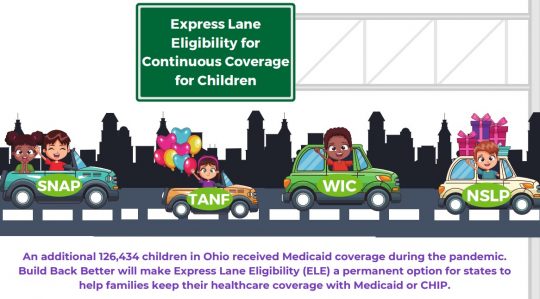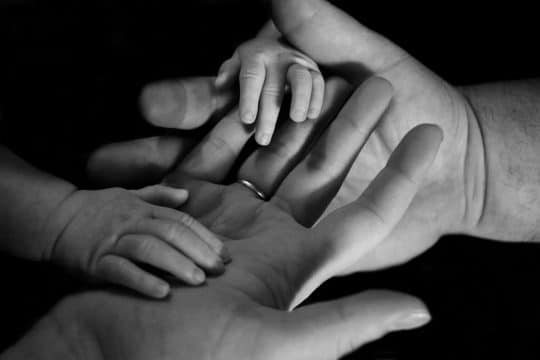 Build Back Better represents an important step forward for Maternal and Child Health
Build Back Better represents an important step forward for Maternal and Child Health
December 9, 2021
By Kelly Vyzral, Senior Health Policy Associate
On November 19, 2021, the U.S. House of Representatives passed the Build Back Better Act (BBB), which includes historic investments in maternal and child health. The House bill will strengthen health coverage and access to care for children and families nationwide, improving lives now and in the long term. The U.S. Senate is expected to take up the bill before the end of the year.
Children’s Coverage
Among the child health provisions, the BBB Act would permanently require states to provide 12 months of continuous coverage for children under the age of 19. This means that children can maintain Medicaid coverage even if their parents experience a change in income during the year. Continuous eligibility is a valuable tool that helps states ensure that children stay enrolled in health coverage and have consistent access to needed health care services. When children have health insurance, they do better in school, graduate at higher rates, earn higher incomes, and pay taxes that support the state’s economy. Ohio has opted into 12 months continuous coverage for children and making that coverage a requirement gives families security and stability in knowing coverage for children will be guaranteed.
Build Back Better also makes CHIP (Children’s Health Insurance Program) funding permanent. Under current law, federal funding for the CHIP program is only available through the end of fiscal year 2027, when it will have to be reauthorized by Congress. BBB would make federal CHIP funding permanent and ensure that states always have sufficient federal funding to support and expand their CHIP programs. CHIP is a partnership between the state and federal government to provide health insurance for children in families that earn too much to qualify for Medicaid but cannot afford private insurance. According to a study done by the Kaiser Family Foundation, over 211,000 children in Ohio were covered by CHIP in 2020.
Another improvement BBB would make to Medicaid/CHIP is the permanent extension of the Express Lane Eligibility (ELE) option for states. ELE provides states with important new data sources to ensure that children eligible for Medicaid or CHIP have a fast and simplified process for having their eligibility determined or renewed. Making the ELE option permanent would give states confidence in the stability and longevity of the program and encourage them to invest in technology needed to maximize the efficiency and effectiveness of the program.
states with important new data sources to ensure that children eligible for Medicaid or CHIP have a fast and simplified process for having their eligibility determined or renewed. Making the ELE option permanent would give states confidence in the stability and longevity of the program and encourage them to invest in technology needed to maximize the efficiency and effectiveness of the program.
ELE designates certain programs such as Supplemental Nutrition Assistance Program (SNAP), School Lunch, Temporary Assistance for Needy Families (TANF), Head Start, National School Lunch Program (NSLP), and Women, Infants, and Children (WIC) as express lane agencies. The information from these agencies can then be used to help facilitate enrollment in Medicaid/CHIP. Under ELE a state can also use information from state income tax data to identify children in families that might qualify and so that families do not have to submit income information.
We encourage Ohio Medicaid to take this opportunity to enable ELE and give county Jobs and Family Services (JFS) agencies the ability to use all available data sources to enroll and renew children in the Medicaid program quicker and more easily.
Maternal Health
One of the most important pieces in BBB is the language that permanently requires states to extend postpartum coverage for 12 months. As Ohio and the country face a maternal health crisis, this investment in healthy beginnings for mothers and their children is critical. The United States has the highest maternal mortality rate of any developed country, and this rate is higher than it has been in decades. Every year, women in Ohio die preventable deaths of complications from pregnancy, even weeks or months after giving birth. Recognizing this crisis, Ohio took steps in the recently enacted state budget to extend Medicaid coverage to birthing people 12 months postpartum, which takes effect April 1, 2022. The BBB would mean that this state option, which can be undone at the whim of the legislature, is required.
The Build Back Better bill would establish a new permanent Medicaid state plan option for maternal health homes, which provide team-based care to pregnant and postpartum people. The maternal health home option works to provide coordinated, culturally competent team-based care to pregnant and postpartum people and helps to link mothers and children to resources for all their medical and social needs. The maternal health home team can include medical providers, doulas, community health workers, behavioral health specialists, social workers, interpreters, and other partners who can support the medical and social needs of pregnant and postpartum people
As a financial incentive for states to adopt the maternal health home model, services that meet criteria would be eligible to receive a 15-percentage point increase in the federal Medicaid matching rate (FMAP) for the first two years after the state plan amendment takes effect
The changes proposed represent significant improvements in coverage and access to care to ensure that children and new parents can realize healthier lives and outcomes.
Learn more about Build Back Better and the provisions that support child and family wellbeing. Reach out to your Senators here


 Build Back Better represents an important step forward for Maternal and Child Health
Build Back Better represents an important step forward for Maternal and Child Health